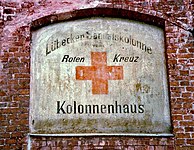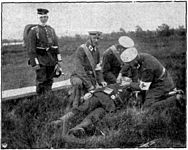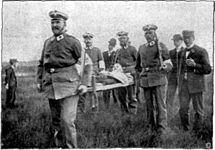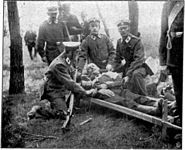Johann Gottlob Judersleben
Johann Gottlob Judersleben (born November 16, 1830 in Flemmingen (Naumburg) , † March 6, 1905 in Lübeck ) was first a non-commissioned officer , later an officer in the Prussian army . He drove the development of the Lübeck warrior medical column and was chairman of the Lübeck Warrior Association.
Life
At the age of 17 Judersleben joined the Guard Corps of the Prussian Army in Potsdam . Here he was promoted to sergeant before he was promoted to Sergeant in Erfurt . There he became accounting officer . When he was then transferred to Wahlstatt , he was entrusted with the honorable establishment and administration of the cadet house . During his time there, there was a cadet who would later become President of the Reich - Paul von Hindenburg .
In the German war was Judersleben hospital - inspector . With the daily misery of the war in mind, he recognized the value of a well-organized medical service and well-trained medical personnel . From then on, he strived to create and promote this.
After the war he was promoted to lieutenant by King Wilhelm I and in 1867 Judersleben was given the management of the Plön Cadet House . In 1891 he had to apply for his retirement for health reasons. This was complied with and Juders' life set à la suite .
After his retirement he moved to the Free and Hanseatic City of Lübeck (Blücherstraße 19). Here he devoted himself to two tasks:
Warrior clubs
On the one hand, he campaigned for the unification of those who had left the military “in the gears of the big city”. In 1894 he founded the Association of Former Comrades of the Guard Corps and became its chairman, whereupon other military associations were established, such as B. the Comradeship Association of the 76ers and 162s, the association of former cavalrymen, pioneers, hunters, artillerymen and other troops . When these clubs merged with Judersleben's active participation to form the Lübeck Warrior Association, Judersleben was elected chairman. At the same time he represented Lübeck in the German War Association .
Medical column
On the other hand, Judersleben was involved in the development of the Lübeck medical column . Their efficiency was demonstrated to the public every year in a medical column exercise with the support of the local infantry regiment No. 162 .
Their “new stretcher ”, which was presented in 1914, proved its worth as the “Lübeck System” in the First World War in hospital trains and on hospital ships .
Death and burial
During a stay in Berlin at the invitation of the German Warrior League, Judersleben fell, which worsened his fracture disease. He did not survive the operation that had become necessary in a Lübeck hospital.
On the Burgtorfriedhof were after the funeral in the Garrison Church senators Emil Wolpmann (Chairman of Luebeck hospital) and Johann Martin Andreas Neumann (deputy. Police Mr.), Major General Alexander von Linsingen ( 81st Infantry Brigade ), Colonel Henry Nessler including numerous officers of Infantry regiment "Lübeck" (3rd Hanseatic) No. 162, the leave status as well as the Landwehr , the warrior medical column and delegations from 17 clubs. Vice-Admiral Heinrich Kühne laid a wreath from the board of the German Warrior League .
Memberships
- Association of former comrades of the Guard Corps
- Lübeck Warrior Association
Awards
- Red Cross Medal III. class
- Knight's Cross of the Order of the Griffin
- Order of the Red Eagle VI. class
- Order of the Crown IV class
swell
- Father Urban Leaves . Lübeck, March 12, 1905, article: Leutnant a. D. Judersleben †.
- Lübeck leaves . No. 11, March 12, 1905, article: Leutnant a. D. Judersleben †
Individual evidence
- ↑ Father-city sheets. July 28, 1907, article: Medical column exercise on the Palinger Heide.
- ↑ From Lübeck's Towers. Saturday, May 30, 1914, article: The medical column's training run.
- ↑ From Lübeck's Towers. Saturday, November 7th, 1914, article: The establishment of the club's hospital train.
| personal data | |
|---|---|
| SURNAME | Judersleben, Johann Gottlob |
| BRIEF DESCRIPTION | Prussian lieutenant |
| DATE OF BIRTH | November 16, 1830 |
| PLACE OF BIRTH | Flemmingen (Naumburg) |
| DATE OF DEATH | March 6, 1905 |
| Place of death | Lübeck |








